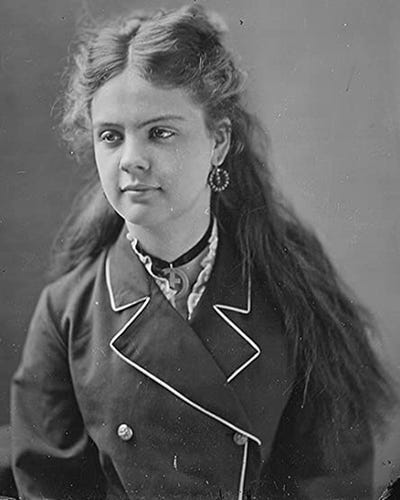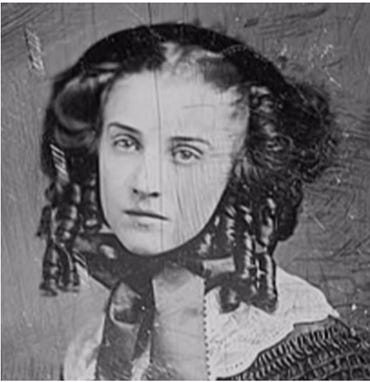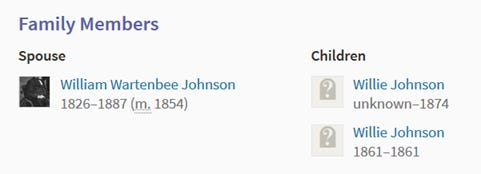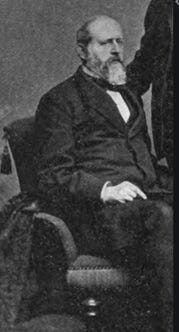“If We Try, We Shall Forget” – Background For The Story of LORENA
“If we try, we shall forget.” ~~Ella Blocksom to Henry Webster “I doubt if all the dark lines are erased from my heart yet.” ~~Henry Webster to a friend in later years
Ella Blocksom was called the sweetheart of the Civil War for she had been immortalized in the song, Lorena. This song was published in 1858, becoming an instant hit and had continued in its popularity during the Civil War, being sung by soldiers on both sides. One Confederate officer claimed that this song caused them to lose the war because so many men had deserted, going home to their wives or girl friends, to their own Lorenas after hearing this mournful song that caused them to become homesick. And if they hadn’t deserted, the song caused many to lose their effectiveness in fighting. Some officers banned this song from being sung by their troops in order to keep men from deserting, to keep them fighting. Then when the war had ended the name Lorena became a very popular girl’s name as many surviving men named their baby girls Lorena.
The song was written in 1856 by Henry Webster, after meeting the composer Joseph Webster. Joseph had written a piece of music that needed lyrics, so Henry wrote his poem about Ella in less than two days, a poem of their love for each other and their parting. In his poem he had added what she had written in her last letter to him, “If we try, we shall forget.” Henry had first titled his poem Bertha in order to protect Ella’s identity, but then Joseph had needed a three syllable title, so Henry created a new girl’s name, Lorena, adapted from the name Lenore in Edgar Allan Poe’s poem, The Raven.
The Courting of Ella:
Being orphaned, Ella moved in with her sister and brother-in-law. They were members of the Universalist Church in their home in Zaneville, Ohio. In 1849 Henry Webster had become the new minister of their church. At his time Ella was a young beautiful 19 year old woman and Henry was 25 years old. He noticed her and began walking her home from choir practice and then began accompanying her to other church activities. His courting took them on long romantic walks to the top of a nearby hill where they watched the sunset and dreamed dreams. Being poetic he may have won her heart with his beautiful prose or just his charm. It wasn’t long before they became engaged and had begun planning their own wedding.
Ella’s sister and brother-in-law had hoped that they would lose interest in each other and when they hadn’t, her brother-in-law stepped in and told Ella that they would disown her if she didn’t break off with Henry. After all, he was a poor minister and not from a wealthy prominent family.
Ella gave in to their wishes and took one last walk up the hill with Henry. Handing him back her engagement ring, they slowly walked down the hill just as the sun was setting, and in the distance the church bells rang.
After their breakup Henry resigned as the minister of her church and left to become a minister in another town. He had only been in Zanesville for one year.
When Ella heard the song years later she knew that it had been written about her; it had not been disguised well enough. It is claimed that she was not happy about it, probably because by now she was married to a prominent lawyer who later became the justice of the Superior Court of Ohio, just as her sister (or father) had wished. Did the song bring back too many memories? Was she happy in her marriage? We don’t know her true feelings, but we do know Henry’s feelings at that time for while he was in his second marriage, he confessed to a friend in a letter: “I doubt if all the dark lines are erased from my heart yet.
It has been 161 years since this song had been published, and even after this long it is still being sung and used in movies as background music, although it is not as popular as it once had been.
I listened to the song being sung just over a week or two ago, and I only remembered its tune. If I had heard it in my youth, I would have learned all the words to it because I used to love to sing. And I know that I would have also been forcing back my own tears, as I am still deeply moved by sad love songs.
Lorena
The years creep slowly by, Lorena
The snow is on the grass again
The sun's low down the sky, Lorena
The frost gleams where the flowers have been
But my heart beats on as warmly now
As when the summer days were nigh
The sun can never dip so low
Or down affections cloudless sky
A hundred months have passed, Lorena
Since last I held that hand in mine
And felt the pulse beat fast, Lorena
Though mine beat faster far than thine
A hundred months, 'twas flowery May
When up the hilly slope we climbed
To watch the dying of the day
And hear the distant church bells chime
We loved each other then, Lorena
More than we ever dared to tell
And what we might have been, Lorena
Had but our loving prospered well
But then, 'tis past, the years are gone
I'll not call up their shadowy form
I'll say to them, "lost years, sleep on"
Sleep on, nor heed life's pelting storms
The story of that past, Lorena
Alas! I care not to repeat
The hopes that could not last, Lorena
They lived, but only lived to cheat
I would not cause them one regret
To rankle in your bosom now
For "If we try, we may forget"
Were words of thine long years ago
Yes, these were words of thine, Lorena
They burn within my memory yet
They touched some tender chords, Lorena
Which thrill and tremble with regret
'Twas not thy woman's heart that spoke
Thy heart was always true to me
A duty, stern and pressing, broke
The tie which linked my soul with thee
It matters little now, Lorena
The past is in the eternal past
Our heads will soon lie low, Lorena
Life's tide is ebbing out so fast
There is a future! O, thank God
Of life this is so small a part
'Tis dust to dust beneath the sod
But there, up there, 'tis heart to heart
Notes: From the book, History of Lorena, published in 1916:
“The author of ""Lorena"" Rev. Henry de Lafayette Webster, was born in Oneida County, N.Y. in 1824, and died in Chicago on Nov. 3, 1896, have lived to the age of 72 years.”
“Mrs. Judge William W. Johnson, formerly Miss Ella Blocksom, and the original ""Lorena"" is still living (Nov. 1916), at Marietta, Ohio, well on to ninety years of age. She has been totally blind for years. She is the widow of the late Judge W.W. Johnson, at one time a member of the Supreme Court of Ohio.” She died a year later.
About Henry Webster
Henry Webster was born in central New York, in 1824, of New England parents, who, in 1828 moved to northern Ohio and settled near Elyria, Lorain county.
Here, in a pioneer log cabin the boy was reared to manhood, often assisting his father, who was a blacksmith, in his shop. Having met with an accident, which permanently crippled his right hand, he turned his attention to the matter of fitting himself for teaching, and by dint of perseverance and strict economy, acquired an academic education.
After teaching a short time, principally in Kentucky, he entered a law office in Columbus, Ohio, with a view of entering that profession. But becoming interested in a theological discussion between an orthodox and a Universalist divine; he became a convert of the latter faith, and gave up the law for the ministry in the Universalist denomination, which was a sad blow to his aged mother, who was a very strict, consistent member of the Methodist church.
The matter, however, set her to thinking and in a year or so she too, became an avowed believer in universal salvation, and was ever proud of her “preacher boy.”
Now, as to the true story of “Lorena,” I will say that I write from the knowledge of the facts gained from a long acquaintance and association with the author, Rev. H. D. L. Webster, who was an uncle of mine, being my father’s youngest brother, and but nine years my senior. His first pastorate was in Zanesville, Ohio. There he be acquainted with a Miss Ella Blocksom, which acquaintance ripened into a mutual attachment and engagement.
A wealthy married sister, with whom the girl made her home, had higher notions for her than that she should marry a poor preacher, and broke the engagement. The girl afterward married a young lawyer who became Chief Justice of the Supreme Court of Ohio, the Hon. W. W. Johnson. (note from Sharon – William Wartenbee Johnson was a lawyer and judge in Ironton, Ohio) “Thus proving,” as the Rev. Webster afterward said, “the woman’s better sense as to the affair.” Mr. Webster himself, soon afterward married, and if the episode with the Zanesville girl ever caused him much sorrow, none of his family ever suspected it.
In 1853-4 he was pastor of a congregation in Warren, Mass. In March of the latter year he wrote the song, using the name Bertha, which was published in a Boston paper. In 1858 he occupied the pulpit in the Universalist church in Racine, Wisconsin. Here he formed the acquaintance of J. P. Webster, who was then a popular composer of music, and under contract with Higgins Bros., of Chicago, to furnish them all the music he should compose, at a stipulated price. The preacher showed the verses to J. P. Webster, who, after reading them, asked permission to take them along with him, which was readily granted. It was then about 11 p.m., but before morning the music, as later published, was virtually completed, as the author afterward said “a case of inspiration.”
There was one thing, however, that troubled him, and that was the name. He wanted a name of three syllables; and appealed to the author of the words to help find one suitable for the occasion. They together spent nearly as much time in finding a suitable name as the author had in writing the music. Finally, as if by inspiration, the name Lorena was suggested and adopted. It was first published by Higgins Brothers of Chicago, in 1857, and met with an almost unprecedented sale, the publishers making many thousands of dollars from its circulation. The price paid to J. P. Webster for writing it was the paltry sum of $25.
Widowed in 1887, Mrs. Johnson also survived her two children and the Rev. Webster, who died in 1896. Blind during the final years of her life, she was 89 at the time of her death.
William Johnson
Soldiers:
Slides:










